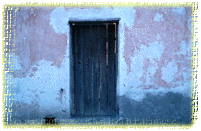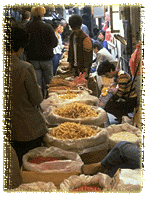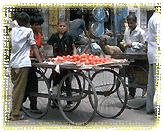 |
 |
 |
|
|||
|
Beyond the Border: The life of an ex-patriate
Dear Rudy, According to an article I was reading in British Vogue, the one thing women want more than anything else (including sex and money) is the one thing I have: time. I have time to read, time to walk in the ferny palm-lined park, time to cook little meals seasoned with fresh herbs and arranged on handmade plates.
How can both these realities exist in the same woman? I am by all accounts a failure and yet I'm happier now than when I was younger, richer and prettier. Is it hormonal? Do all of one's ambitions begin to fade or lose importance as one gets older? I don't think so. Neither do I think I've mellowed, accepted reality or "grown up" as they like to say in certain therapies. I've just kept moving further and further away from places and situations that made me miserable. First I gave up living in an expensive house in a high pressure town. Then I spent two years half gypsy/half bag lady wandering from coast to coast selling at flea markets and looking for a home. I settled for a little town in Texas where I tried to grow flowers in 100-degree heat, and every chance I got I'd head across the border into Mexico to see if there might be a real alternative for me there.
But I craved days when I could stop thinking about money at all. Days when I could do as I pleased without feeling that someone was looking over my shoulder judging me, comparing themselves to me, feeling sorry for me. I actually moved to San Miguel de Allende, Guanajuato, in 1993 but it's taken me a long time to feel I live, really live, in Mexico. That was partly because I couldn't speak Spanish and partly because San Miguel is an American colony with boutiques and cafes and night clubs more like Santa Barbara, California than the Third World. Slowly, slowly I began to branch out; traveling to Oaxaca by train to Morelia, Michoacan by bus and later driving everywhere alone in my old Jeep. And now I live in Saltillo, Coahuila, in a pink adobe house that used to be owned by Concha la Negra. I sleep on a mattress on the floor but I kept my Chinese rugs. I haul water in plastic buckets and heat it on a two-burner gas stove. And when I take a bath I take it in a tin tub that I bought on time (10 pesos a week for 6 weeks). As I look around my room I see my grandmother's oil lamp, a vase of wild sun flowers, and old pine table I brought from Virginia.
Every couple of months I load my car with antiques and crafts I've found and drive the back roads to Texas where I sell them to friends and at the same old flea markets. It's a life I can handle. As long as I know I can escape, I can survive a week in the first world.
|
 | American Public Media Home | Search | How to Listen ©2004 American Public Media | Terms of Use | Privacy Policy |

 I have time to paint my fingernails and write long letters. However,
when I try to describe my life in Mexico to friends in the United
States, it suddenly sounds slothful, wasted and slightly embarrassing.
I have no career, nothing to show for my fifty years of living on this
earth, and no plans.
I have time to paint my fingernails and write long letters. However,
when I try to describe my life in Mexico to friends in the United
States, it suddenly sounds slothful, wasted and slightly embarrassing.
I have no career, nothing to show for my fifty years of living on this
earth, and no plans.
 I wanted another world -other values, otros puntos de vista. Is
this what they meant by voluntary simplicity? I really never stopped
being a hippie but there were times, like my time in Washington D.C.
when I did try to keep up some kind of appearance of normalcy.
I wanted another world -other values, otros puntos de vista. Is
this what they meant by voluntary simplicity? I really never stopped
being a hippie but there were times, like my time in Washington D.C.
when I did try to keep up some kind of appearance of normalcy.
 It looks very British Vogue actually (adobe walls are quite chic, you
know). It's a struggle to pay for light and rent and food here too,
but it's not stressful like driving to work in rush hour traffic. I
trade tomatoes for potatoes with my neighbors and buy tortillas for
two pesos a kilo.
It looks very British Vogue actually (adobe walls are quite chic, you
know). It's a struggle to pay for light and rent and food here too,
but it's not stressful like driving to work in rush hour traffic. I
trade tomatoes for potatoes with my neighbors and buy tortillas for
two pesos a kilo.